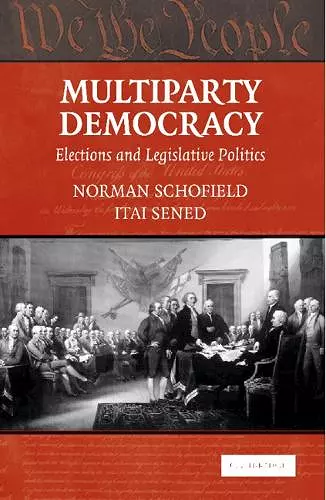Multiparty Democracy
Elections and Legislative Politics
Norman Schofield author Itai Sened author
Format:Hardback
Publisher:Cambridge University Press
Published:31st Jul '06
Currently unavailable, and unfortunately no date known when it will be back
This hardback is available in another edition too:
- Paperback£24.99(9780521456586)

Offers a model of elections and legislative politics in Israel, Italy, the Netherlands, the US, and the UK.
This book adapts a formal model of elections and legislative politics to study party politics in Israel, Italy, the Netherlands, Britain, and the United States. The model uses the idea of valence, that is the party leader's non-policy electoral popularity.This book adapts a formal model of elections and legislative politics to study party politics in Israel, Italy, the Netherlands, Britain, and the United States. The approach uses the idea of valence, that is, the party leader's non-policy electoral popularity, and employs survey data to model these elections. The analysis explains why small parties in Israel and Italy keep to the electoral periphery. In the Netherlands, Britain, and the US, the electoral model is extended to include the behavior of activists. In the case of Britain, it is shown that there will be contests between activists for the two main parties over who controls policy. For the recent 2005 election, it is argued that the losses of the Labour party were due to Blair's falling valence. For the US, the model gives an account of the rotation of the locations of the two major parties over the last century.
"Multiparty Democracy contributes immensely to both the formal theoretical literature on party competition, and to the empirical literature on elections and party behavior. Schofield and Sened demonstrate that incorporating the influence of valence issues namely, party leaders' non-policy-related reputations with respect to competence, integrity, and charisma into the standard spatial model provides critical insights into election outcomes and party strategies. Furthermore, the authors do a marvelous job highlighting political elites' strategic incentives to appeal to party activists, who can provide the resources used to carry the party message to the electorate. This blend of state-of-the-art formal theory and richly detailed empirical analyses of party politics in Israel, Italy, Britain, the Netherlands, and the United States, makes Multiparty Democracy as an instant classic." James Adams, University of California, Davis
"Schofield and Sened investigate a problem at the heart of both the theory and the practice of representative government. This is the relationship between the preferences of citizens including preferences that may have nothing to do with policy and the outcomes of political competition. The authors investigate this problem in a way that is all too rare in political science, combining rigorous and creative theory with innovative and extensive data analysis, applied to particular important cases. The result will please both those whose main interests lie in theoretical models of political competition, and those whose main interests lie in the politics of real party competition." Michael Laver, New York University
"Multiparty Democracy is an ambitious project. Norman Schofield and Itai Sened have successfully tackled a long-standing problem in positive political theory -- that of linking together pre-electoral maneuvering, elections, coalition building, and governance in a single comprehensive framework. In doing so they have offered many innovations. Perhaps the most significant is a new emphasis on voter assessments, not only of candidate and party policy inclinations (as is fairly standard in the literature), but also of partisan fitness to govern. This is a major accomplishment and is likely to set the agenda for future research for years to come." Kenneth A. Shepsle, Harvard University
ISBN: 9780521450355
Dimensions: 235mm x 158mm x 19mm
Weight: 454g
248 pages